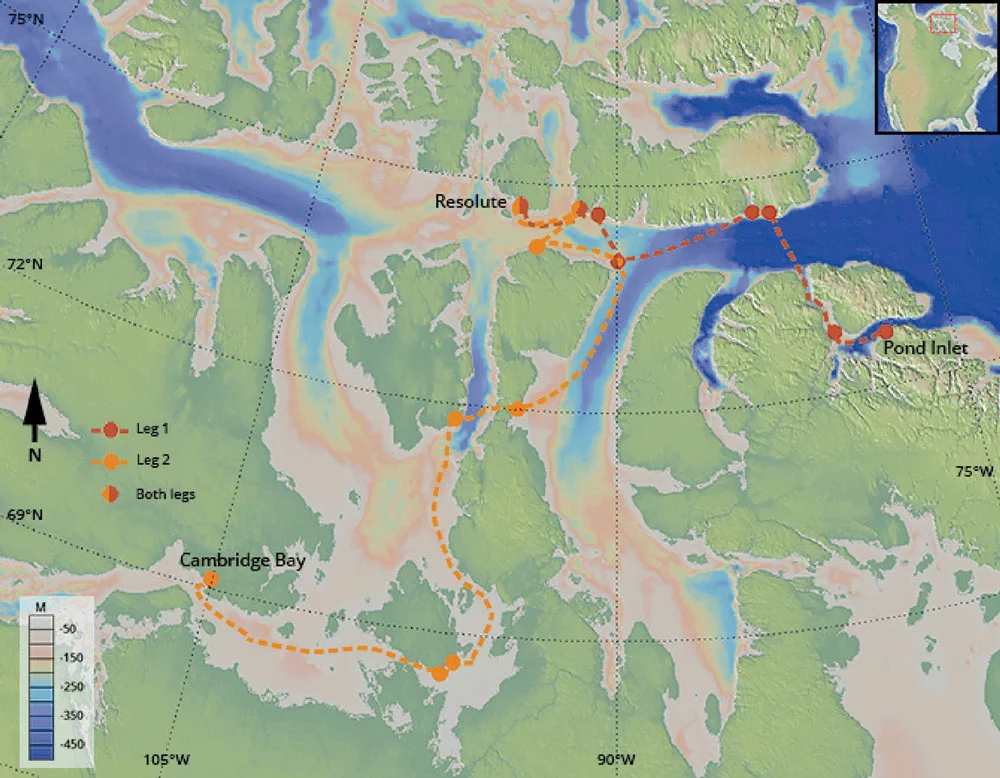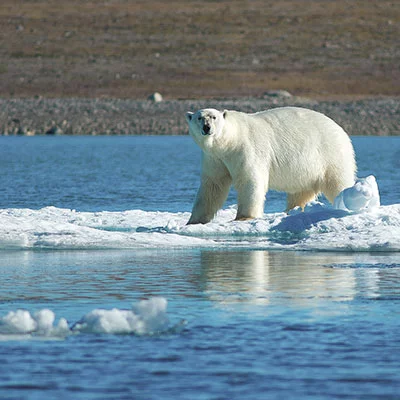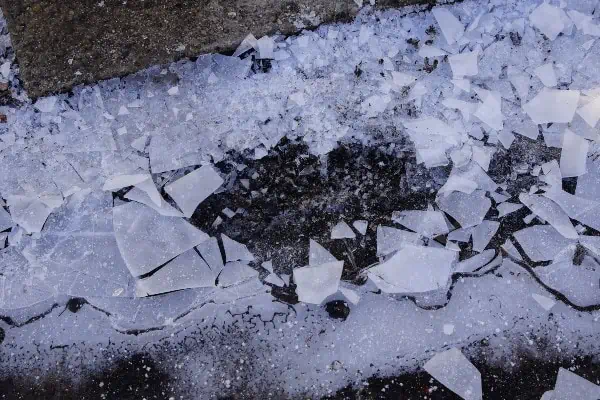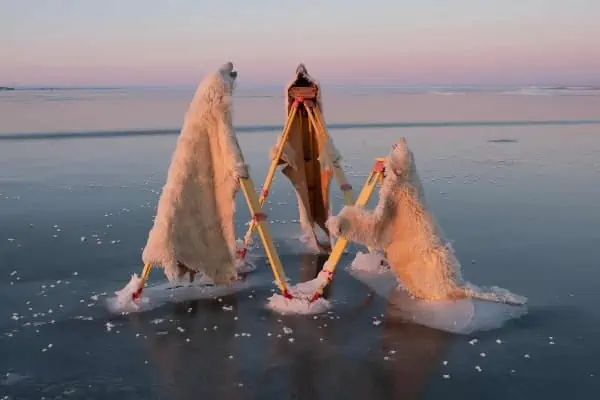(Ed. Note: The following article was first written for the Northwest Passage Project excursion to take place last summer from August 23 to September 13 aboard the R/V Akademik Ioffe. Shortly after departure, the expedition was grounded on the western Gulf of Boothia in the Canadian Arctic Archipelago and cancelled. WUY did not print the article and has updated it to reflect this year’s attempt.)
World’s first interactive live broadcasts from the Northwest Passage are happening July 18 to August 4 2019

The quest for a sea route through the Arctic between the North Atlantic and Pacific oceans has long captivated the minds of Canadians. This month, the world once again looks to the North as an intrepid group of scientists, filmmakers and students produce the world’s first live, interactive broadcasts from the Arctic Ocean’s Northwest Passage. The group is conducting research aboard the Swedish Icebreaker Oden. The project gives us a glimpse of the Arctic Ocean in real-time as the explorers discuss their research through live, interactive broadcasts. The three-week expedition began August 23 and will continue until September 13, and public events are streaming through Facebook Live.
“This is really the first time that anything like this has ever been done. And for good reason, because up until recent years it was completely iced over for most of the year,” said Gail Scowcroft, associate director of the Inner Space Center at the University of Rhode Island’s Graduate School of Oceanography. “This project really brings together, for me, everything that I’m passionate about. It’s climate change research, it’s education of the next generation of scientists, and it engages the public to help them understand the science and what’s truly happening.”
The expedition team has planned 36 broadcasts to museums and science-centre partners, as well as three public Facebook Live events. “We are broadcasting on days where we will have satellite service available to us. At high latitudes such as this, any time there is significant elevation in the landscape the satellite signal gets blocked because of the low angle,” said Scowcroft. “There are some fjords, for example, up there with pretty steep cliffs. Whenever we’re in that environment we won’t be able to reach the satellite.”
The expedition also includes a group of undergraduate and graduate students who are interested in pursuing careers in STEM (science, technology, engineering and mathematics). “It is imperative that we educate the next generation of scientists who will be addressing really important scientific concerns and human concerns over the next several decades. And so I think that giving these young folks the opportunity to experience this environment hands-on, as they conduct research side by side with leading scientists, will change their lives,” said Scowcroft.
Scowcroft sees Arctic research as a key to understanding climate change on a global scale. She said that the Arctic region impacts the entire planet because any change to the Arctic climate produces a ripple effect that is felt by all of us. “If you think of the Earth as [being] like a giant spiderweb, the Arctic is one of the main radial threads of that spiderweb. Anything that touches it is felt by the entire web. That’s how I think about it,” she said. “The Northwest Passage is a key area in terms of the meltwater flowing into the North Atlantic, where it’s a driver of ocean circulation […] We really don’t have a lot of information about the water circulation up there or how greenhouse gasses are being exchanged with the atmosphere. Our scientists will be providing pieces of this climatic puzzle through their research,” said Scowcroft.
Scowcroft said that the consequences of the melting polar ice will have drastic effects on local wildlife that depend on ice for survival, and she said it’s having big impacts on Inuit communities because they also rely on the ice. The melting also has global implications. “We depend on the ocean to take a good deal of the carbon dioxide that we produce out of the atmosphere, and that if that happens, the amount of carbon dioxide that the ocean can sequester changes because of circulation between the Arctic and the Atlantic,” she said.
Because the scale of the ongoing global warming is unprecedented in recorded human history, Scowcroft said that modern science is treading in unknown territory. “Nobody has a crystal ball. There’s a lot of uncertainty in science because the changes that we’re experiencing have never happened so rapidly on the planet before. We have no evidence that can tell us what we should actually expect. So it’s all based on modelling and prediction.” While the opening of the Northwest Passage presents some interesting maritime shipping potential, from an economic perspective, Scowcroft said that the signs all point to serious environmental damage as well as risk to human and animal life.
Scowcroft said that she hopes the research initiative will gain further steam after the expedition ends and that the scientific party can contribute significantly to the global community’s understanding of what’s happening in the Arctic. She also said that the public-education aspect is extremely important. Her team’s public-engagement initiatives include a documentary film, podcasts, webinars, as well as seminars at universities and museums across the United States. “The people that we reach will have a much better understanding of why scientific research is important in the Arctic, what’s happening in the Arctic and how the changes that are happening up there are not just impacting the Indigenous communities and wildlife, but also their own lives.”
“Think about communicating from the Arctic 150 or 200 years ago. They would hand letters to a ship heading south, or a reporter would send his notes down to a newspaper. it would sometimes take a year, sometimes two years before people read the letters or got the reports about what was going on up in the North, and here we are sitting up there sharing what we are seeing and experiencing live, instantly, to the world. What a change that is!” said Dave Clark, one of the principal investigators on the Northwest Passage expedition.
“The opportunity to actually be up there and live it and see it for ourselves is very exciting.” Clark is an Emmy Award-winning documentary filmmaker who has worked on a variety of northern projects with National Geographic, over the past 30 years, including a 1976 expedition in the Yukon for a film called Yukon Passage. “That was my first exposure to the Yukon, and it was one of the best experiences of my life,” said Clark.
Drawing on his connection with the North, Clark said that he became aware of the warming and opening of the Northwest Passage in the summertime. “It just seemed kind of obvious to me. Here you have this remote, harsh, isolated place called the Arctic, and all of a sudden ships can travel through in the summertime because the ice is melting and never did before,” said Clark. He came up with the idea of making a documentary film about the Northwest Passage and pitched a partnership to the University of Rhode Island. “Everybody is hearing about the issues in the Arctic and they want to know more about it, so it’s a timely topic and it’s exciting. You think about what the Arctic is and how remote it is. It’s a very intriguing place,” said Clark.
His documentary angle morphed into a serious science project and research expedition when they were awarded a grant from the National Science Foundation. “It’s became much bigger than just a documentary, and I’m delighted about that […] and you know it’s been a long haul,” said Clark. The two-hour television documentary, Frozen Obsession, will explore the changing Arctic by documenting the expedition.
In addition to the Facebook Live events, broadcasts are beamed via the Inner Space Center (ISC), the U.S. facility that supports ocean exploration and education, to the Smithsonian National Museum of Natural History (Washington, DC), the Exploratorium (San Francisco, CA) and the Alaska Sea Life Center (Seward, AK). For more information, visit www.NorthwestPassageProject.org.
[box] The allure of the elusive Northern route was immortalized by the Canadian folk musician Stan Rogers, and his musical tribute to the famed northern gateway became a classic.
“Ah, for just one time I would take the Northwest Passage
To find the hand of Franklin reaching for the Beaufort Sea
Tracing one warm line through a land so wild and savage and make a Northwest Passage to the sea” – Stan Rogers
Rogers passed away in 1983 at the young age of 33 in the American State of Kentucky, without ever travelling the route. Today his dream comes closer to reality[/box]





